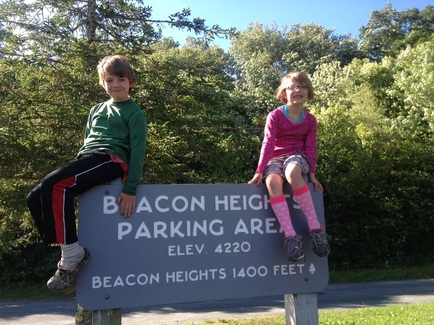 Can you tell our family likes pork? Can you tell our family likes pork? We visit family in Western North Carolina for several weeks, so I found myself thinking of how best to celebrate July 4 with the kids, while Jimmy was smoking pork all day for the evening BBQ. Not that everything has to be a lesson, but I'm sensitive to holidays losing their meaning. So, what do I want Independence Day to mean to my children? What do I love most about my country? The answer is easy: what I love most is the country, the land. And our legacy of wildly stunning public lands are the envy of many other nations. So we piled in the car to get some exercise and some perspective. On the winding drive I explained what a National Park was, and how the Blue Ridge Parkway belonged to every American--even them. Then we started hiking. We live at about 1300 feet elevation.We began our ascent at 2820 and topped out at 4220. We got perspective, alright. Even though they'd been to these mountains previous summers, the kids reacted in awe. They stopped and stared. Then they ran around, staying well back from the edge. There were big rocks to peer under and all sorts of things to discover first. Of course it only felt like they were the first to discover them. Unlike Columbus, though, they didn't try and stake a claim.
Right then it occurred to me that freedom often comes because we agree to share. To share land, roads (and their care). Basic services that I might need more one year and you might need more the next year, but that we each pay into every year, like the National Guard and other military branches. This freedom to experience the natural world is worth fighting for, if you ask me, and is why I'm such a huge advocate for our public lands. There are always politicians out there trying to convince us we're better off selling our National Parks, Forests, Monuments, Wilderness Areas, etc., so they can be run privately. That strikes me as unpatriotic. Certainly it's undemocratic, putting our natural national treasures into private hands. And it's not sharing. So as my kids explored freely, I vowed to take them outside more to places patriots have worked hard to protect and make accessible. To see the beauty of this land and to get to know their country. And I vowed to share more. Except when it comes to bacon.
2 Comments
Recently I had a fun weekend, camping at a friend's remote place in NY--pottery studio, pond with water lilies and Koi, free range dogs and chickens, canoe, strawberry wine, s'mores. . . You get the picture. I brought my kids, and my bestie brought her adult son to meet her new sweetie who's a potter (it was his place). The kids and I hadn't seen her son, Jamie, since Christmas, so we were all excited. After I set up camp, my son wandered over. Gloria was still making stuff with clay and the others, but Gabe was ready to canoe. We don't get a lot of time just the two of us, and being on the pond with him, showing him how to hold the paddle, maneuvering around (and through) the water lilies, and seeing how fast we could go was wonderful. I like that he learns some of this stuff from his mother. That he will not grow up thinking women hate the outdoors or can't handle themselves there or are no fun to be with outdoors.
But I realized I take our outdoor activities for granted. My friend's son, Jamie, lives with a serious, painful back injury that's classified as a disability. He does not complain, but it affects every moment. He wanted to take the canoe out, and my daughter wanted to go with him. It's a small pond, she's a strong swimmer. What's the worst that can happen? They get wet--so what? Ok, the worst that could happen is the attempt is so frustrating it crushes his spirit and makes him feel like he can't do anything. This is called perceived risk, where the risk is emotional or social, and as an outdoor instructor I consider this as important as physical risk. But I believe in experiential education and this was his idea, so we encouraged them to go. He did not ask for help, so his mother and I offered none. We watched from the house as they pulled the canoe to the edge (there was no beach or landing), my daughter got in at the front, and with a lot of shoving and scooching they got the canoe in without getting wet. Then they snaked around the pond, Jamie doing all of the paddling. When done, they even climbed out onto the high bank without tipping over. We whooped from the house where we raised our wine glasses to his success, as Jamie pulled the canoe onto the grass. That night he kept talking about the experience. That half hour empowered him, brought him back to the person he'd been who loved camping. He felt like he regained some of his independence and couldn't wait to report to his aide and doctors. There are so many benefits to outdoor recreation, and most have nothing to do with how "extreme" the activity is. It's us existing in the world without electronics or motors. And to me, remembering that I am an animal is the biggest benefit of all. Here's to you, Jamie. You're such an animal. Last Saturday, a friend and I took our kids to Elmira, NY for an event that combines almost everything I am passionate about: fun, dirt, literacy, and interdisciplinary education. Tedd Arnold, a prolific children's author & illustrator (of Fly Guy and Parts fame), was reading from his recent book, Dirty Gert, at the ribbon cutting ceremony for the new children's sensory trail. Tedd's a great reader, and defines the bigger words so all his audience can follow. To explain what "civilized" meant, he had everyone pretend to hold a tea cup with their pinkies out. (Spoiler alert: Dirty Gert doesn't get civilized, and her parents love her anyway. Yay for happy endings!) All along the short kid-friendly trail, kids follow the pages of the book posted as markers, and there are stations for all the senses and to learn about the plants and animals. I think it's wonderful how the Nature Center thought to link the trail with a story that shows the importance of soil and mocks our civilized repulsion of anything dirty. And by having Gert as the main character, he shows that girls don't need to be more civilized than boys, and gives an alternative to the princess role model. There is also a soil box (not a sand box) at the trail's end, and even a little library on the path. In our educational system, reading, science, and physical education are taught as if they are inherently separate, when really they're about as separate as a mermaid's legs. I'm aware of the challenges of interdisciplinary education at all levels (though I primarily teach teens and adults). It takes more time, more resources (for field trips and speakers), and is harder to test. But it's also easier to teach this way because students are more motivated and interested.
Don't like science? We're going to hear a story. Don't like reading? We're going to hike or to play in dirt. This is also the route toward ecological literacy, our most pressing educational issue. David Orr, who coined the term, says, "the ecological crisis is in every way a crisis of education.... All education is environmental education… by what is included or excluded we teach the young that they are part of or apart from the natural world.” Each of us does not need to know everything. But we need to know that everything is connected and interdependent. And we need to teach this to our children.
It's been a very wet spring, and I keep waiting for the back acres to dry out. I pace at the window. I curse the clouds. Puddles mock me.
Last summer, I was tired of dreaming of snug pre-fab cabins that, if I had the money, I could buy one day and start writing in the next. I have an office that is also my kids' art room—my chaos on one side of the half-wall, their chaos on the other. In some ways, this was lovely. I hate to admit how many of my poems are inspired by things I overhear my kids say. But more and more I found myself wishing for a spare space that was mine, and mine only. A room of my own, as Virginia Woolf, would say. And since I started writing fiction, I figured I deserved one. (Actual quote: "A woman must have money and a room of her own if she is to write fiction.") And though I didn't have money, I did have an idea. And an L. L. Bean catalogue. Any mother who is an artist knows how hard it is to get away from clutter and caterwauls. This is no doubt true of many fathers as well, but in my experience, my husband can tuck away in his upstairs office (that doesn't even have a door) and not be bothered much. But if the kids know I am around--even if my husband is in the kitchen or living room--they holler my name until I emerge like a banshee to ask them what they need. Since I stopped nursing them years ago (they are 7 and 10 years old), what they need is always something Daddy can give them, or answer, or say no to just as well as I can. The day the tent came in the mail, I hefted it back to the space I'd mowed in the meadow, a place carefully chosen for the lack of view of our house or any others. As I started threading poles in sleeves, my children wandered back to watch. "Is this your fort?" my daughter asked. "No, this is my writing . . . Yes, this is my fort. Mama's fort. And no one is allowed unless invited. Understand?" They both nodded solemnly. They knew the rules of forts. "I can make you a sign if you want," my son said. "Like I made for mine." I thanked him and went to grab the folding table and chair. Wow. A fort. Now this was really sounding like fun. Last summer, I woke early, grabbed a big mug of coffee, snatched the bag with my manuscript and laptop, and strolled the short commute to my fort. Zip, I was in. Zip, everyone else was out. Ahhhh. Here the table was always as clear as the air, and I could think. Imagine. Sort things through. That's what a fort is for. I had forgotten. John Muir, one of my hero's, said, "When we try to pick out anything by itself, we find it hitched to everything else in the Universe." Writing outside helps me make sense of my obsessions that seem so random and embarrassing within civilized walls: raising healthy (but dirty) children; teaching students about why and how to get outdoors; trying to get outdoors myself, and with my husband like we used to; gender issues; great books I'm reading (mostly middle grade and young adult novels); writing poetry and my first novel and the very different paths to publication; married life (Hi, Honey!); higher education; odd natural history facts. . . So join me in my fort this summer. Bring your biggest coffee mug, or green tea, or a gin and tonic. And if we can't solve the problems of our day, at least we can laugh at them. But seriously, it has got to dry out so I can pitch the tent. |
LilaceI write, read, recreate, and raise kids in rural Pennsylvania. I teach part-time in Outdoor Recreation Leadership, Creative Writing, and Women's Studies at Mansfield University. Archives
April 2020
Categories
All
|
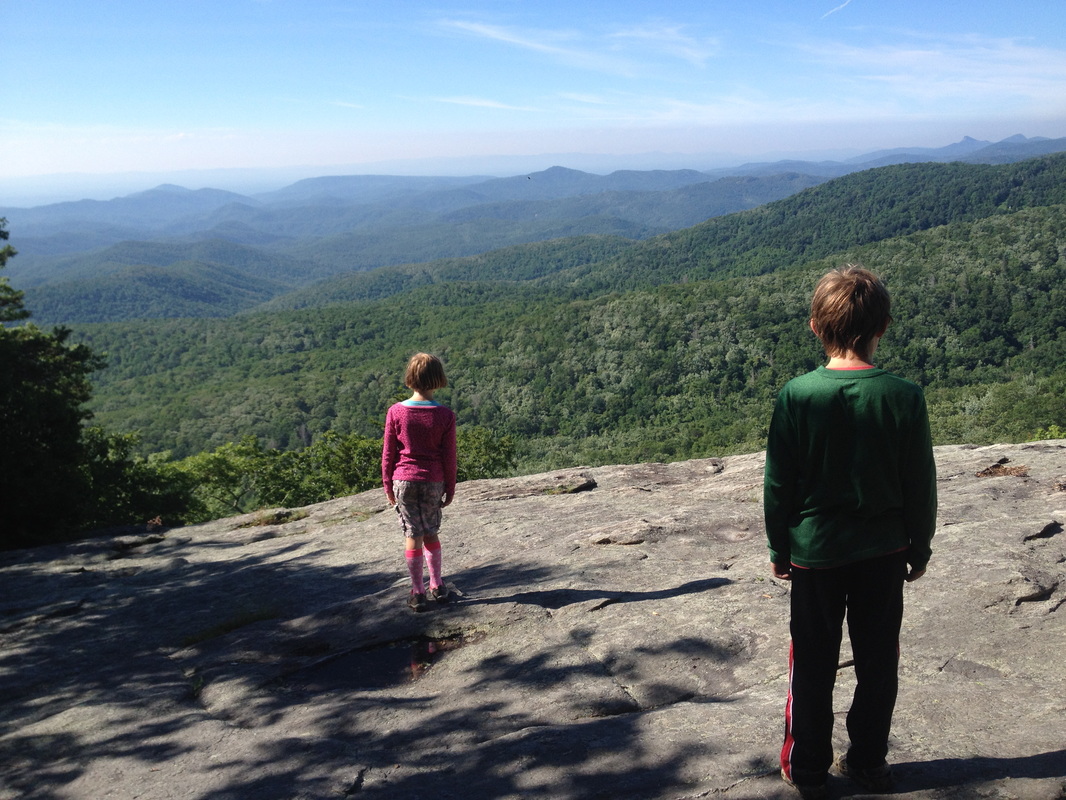
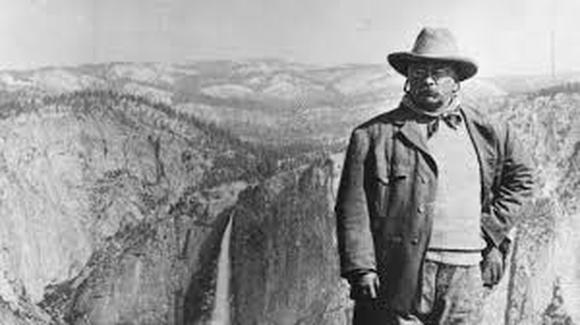
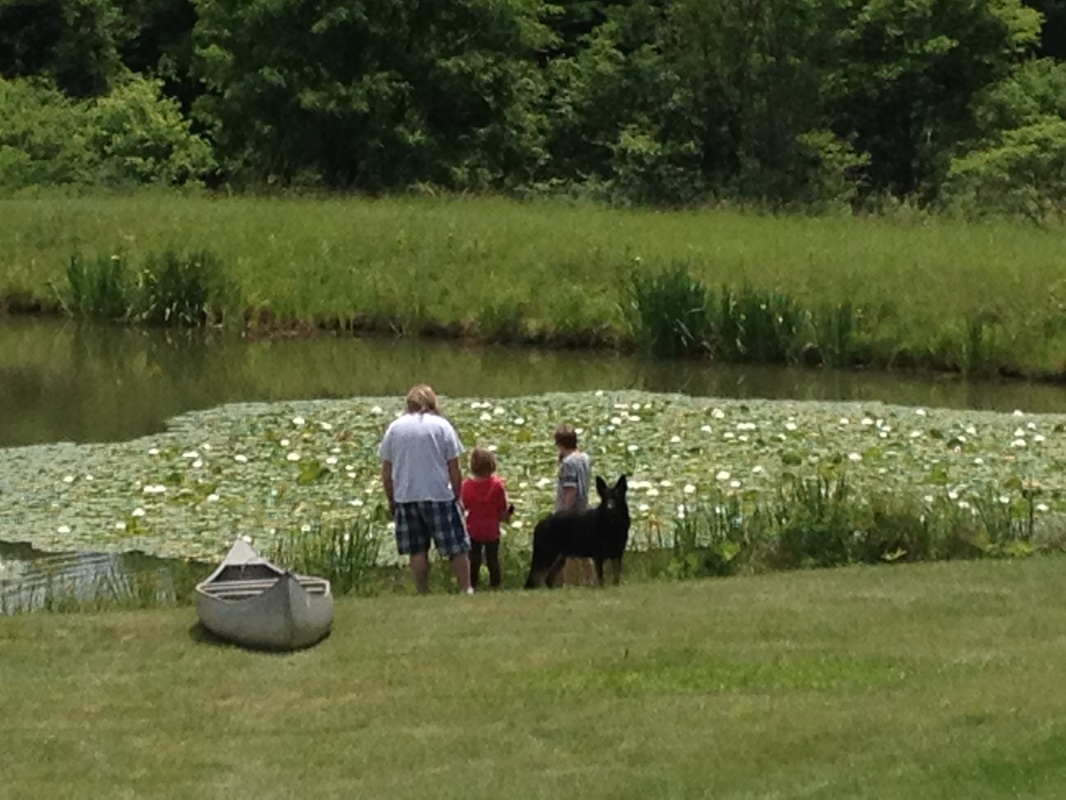
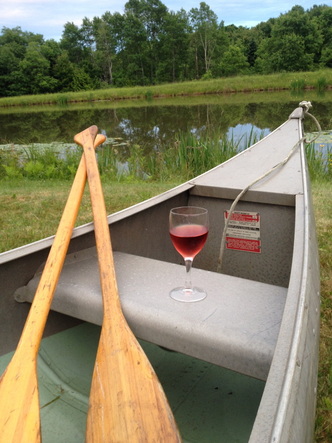
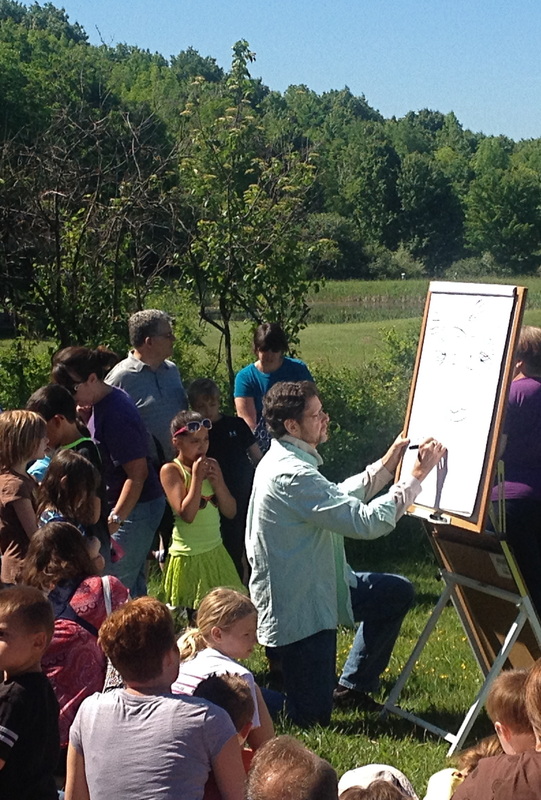
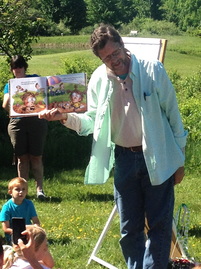
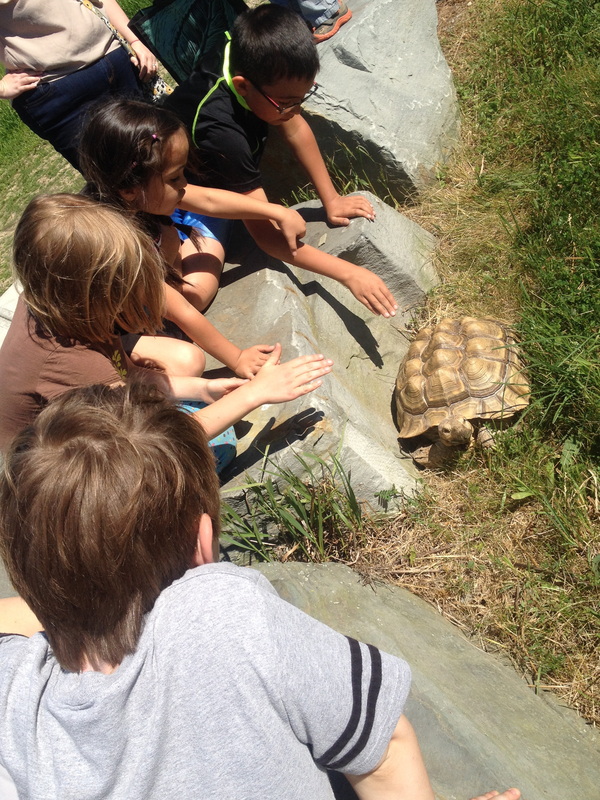
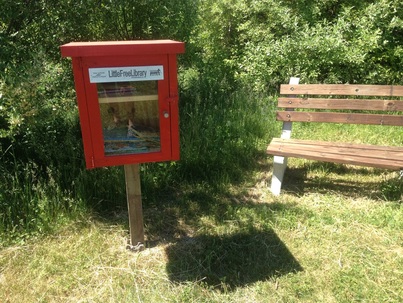
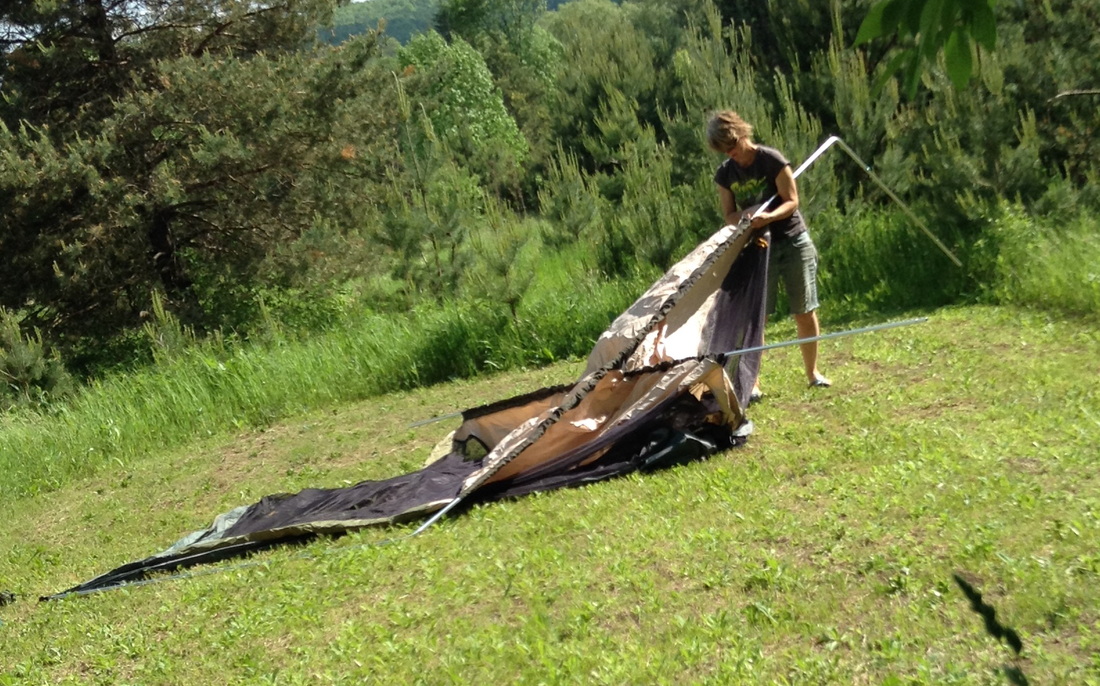
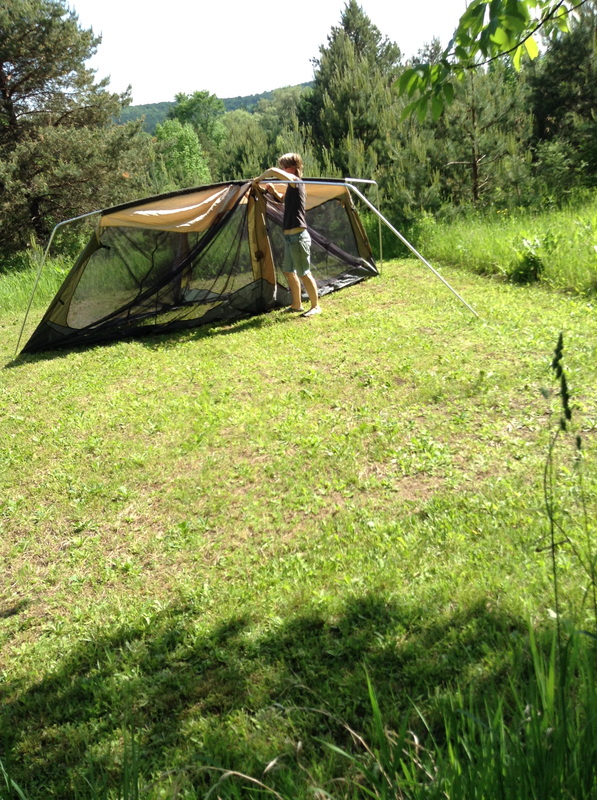
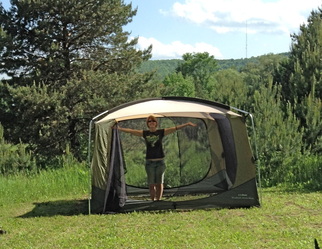
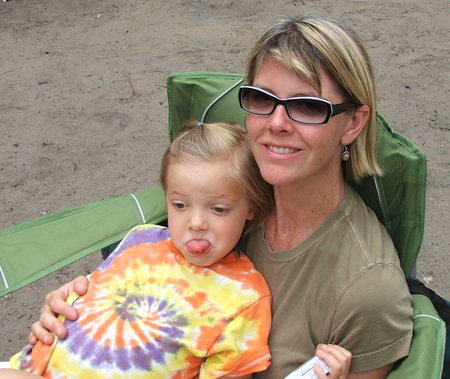
 RSS Feed
RSS Feed
